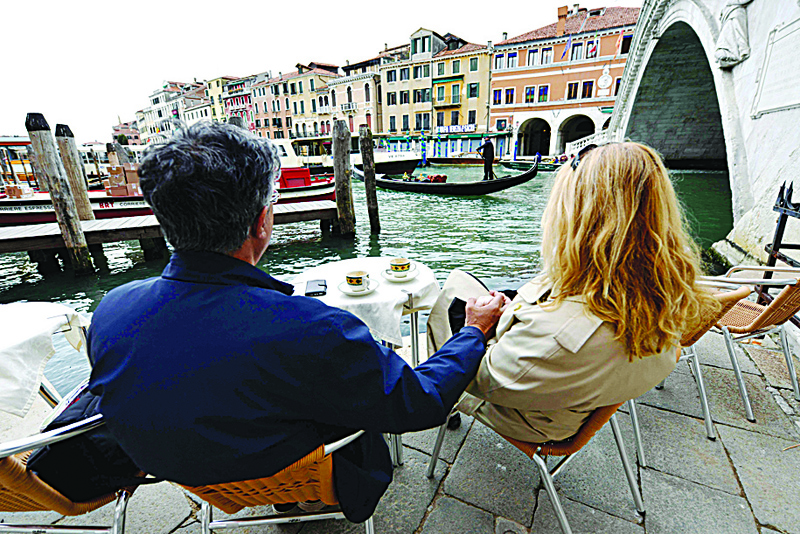 VENICE: A couple has coffee in a bar next to the Rialto bridge in downtown Venice yesterday. - AFP
VENICE: A couple has coffee in a bar next to the Rialto bridge in downtown Venice yesterday. - AFPROME: Bars, restaurants, cinemas and concert halls were reopening across Italy yesterday in a boost for coronavirus-hit businesses, while parliament was to debate the government's €220-billion ($266-billion) EU-funded recovery plan. After months of stop-start restrictions imposed to manage second and third waves of COVID-19, Italy hopes this latest easing will mark the start of something like a normal summer.
Prime Minister Mario Draghi has admitted to taking a "calculated risk" with the reopenings, as infection rates and intensive care admissions have fallen but COVID-19 deaths still mount by hundreds every day and now total more than 119,000. Three-quarters of regions dropped yesterday into the lower-risk "yellow" category, with bars and restaurants permitted to restart table service outside - including, for the first time in six months, in the evening, although a 10 pm curfew remains in place.
"Finally!" said Daniele Vespa, the 26-year-old head waiter at Baccano, a restaurant near Rome's Trevi Fountain, as he made preparations for the return of customers. "Hopefully... we can soon reopen inside as well," he told AFP, adding: "It's the start of a return to normality." Cinemas, theatres and concert halls can also open at 50-percent capacity, followed by the staggered opening of swimming pools, gyms, sporting events and theme parks by July 1.
In Milan, the Beltrade cinema claimed the title of being the first to reopen after six months of inaction with a special 06:00 am screening of "Caro Diario," a classic Italian film from the 1990s. The show was sold out, despite people having to wake up before dawn to catch it. "I went with my husband, and it was great to be back together in a cinema and do this crazy thing," Francesca Pierangeli, one of the 82 people who got a seat, told AFP.
Draghi had been under intense pressure to ease restrictions, including from far-right leader Matteo Salvini and increasingly vocal anti-lockdown street protests, as Italy battles its deepest recession since World War II. The vaccination program is gaining pace with 17.75 million jabs administered so far and 5.2 million people fully vaccinated in a population of around 60 million, but experts doubt this could be enough to stave off a new health crisis.
"Clearly if the gradual reopening is interpreted as a 'free-for-all', a new surge in infections risks compromising the summer season," warned Nino Cartabellotta, head of the GIMBE Foundation health think tank. Already at the weekend, throngs of people took advantage of the warm weather and packed the streets of central Rome and other cities, many not wearing masks. In the capital, police closed off a shopping avenue and a few squares that had become too crowded.
'Necessary reforms'
Italy was the first European country to be hit by the pandemic in early 2020 and remains one of the worst affected, with the EU's highest reported death toll and one of the deepest recessions. The economy contracted by a staggering 8.9 percent last year and a million jobs have been lost.
Italy is pinning its hopes on a €222.1-billion investment and reform plan funded largely by the European Union. Rome is the biggest recipient of the bloc's €750-billion post-pandemic recovery fund. In parliament yesterday, Draghi was to formally present the program he hopes will boost growth by 3.6 percentage points by 2026, ahead of a Friday deadline to submit the package to Brussels.
The government said Sunday the plan was a "historic intervention" that would repair the damage caused by the pandemic and address "the structural weaknesses" of the economy, while putting it on a greener footing. Priorities include infrastructure, notably high-speed railways; green energy, including hydrogen power projects; investment in internet services and digitalization of public administration.
There will be money to help women and young people, who have disproportionately lost out during the pandemic, while around 40 percent will be targeted at historically under-performing southern Italy. Draghi, a former European Central Bank chief, has also highlighted the importance of tax reform and speeding up the snail-paced justice system.
Disputes over the spending plan brought down the previous prime minister and his coalition, after which Draghi was parachuted in to lead a national unity government in February. His broad support in parliament "gives him significant room for maneuver to deliver the necessary reforms", noted Natixis economist Jesus Castillo. - AFP










